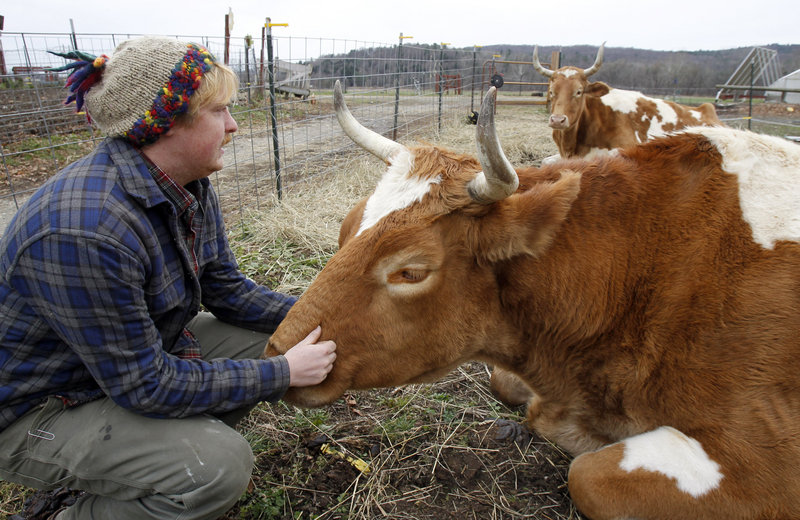POULTNEY, Vt. — Bill and Lou have plied the fields of Green Mountain College’s farm in Vermont for most of their lives — about 10 years.
Students have learned to drive the oxen team for haying and tilling, creating bonds with the giant animals. They’re a campus fixture. But a leg injury to Lou this summer turned the now 11-year-old animals into retirees — and a cause celebre among animal rights activists.
Bill won’t work with another animal, school officials said. So the 825-student private liberal arts school, which promotes sustainable agriculture and strives to serve locally raised foods, has decided to slaughter the animals and serve the meat in the dining hall, just as it has done with other livestock.
In a tradition of giving students real-life experiences, the school opened the discussion up to students and staff at a school meeting in October that about 80 students, faculty and staff members attended. The decision to slaughter the animals was nearly unanimous, even among a student body that the school says is 30 percent vegetarian or vegan.
But now, the school is under attack by those who want the oxen spared and have found a sanctuary for them. Opponents have signed online petitions and sent thousands of emails to staff members. The school received more than 3 million emails from Oct. 13 to 18 from one Internet domain, and got 200 emails from Spain, officials said.
Some emails threatened to shut the college down and hurt donations, the school said; the head of the farm and food project said he has gotten death threats and someone urinated on his car. School officials were not specific about the origin of the threatening emails.
Even area slaughterhouses have been threatened, the school said, to prevent the school from finding a place to butcher them.
“These people are at war, and they don’t take prisoners,” said Bill Throop, provost of the school.
The college and the oxen have become a pawn for the groups’ causes, Throop said.
“I don’t believe that the two animals are the issue,” he said. “The issue is whether small-scale sustainable animal agriculture is an important part of the future in Vermont. We think it is. They think it isn’t.”
Green Mountain Animal Defenders circulated a petition to save the animals. People for the Ethical Treatment of Animals has suggested that if the animals are slaughtered, the students and the public should watch “so that they can see the terror in Bill’s and Lou’s eyes right before a bolt is shot into their foreheads and they are strung upside down and bled to death,” PETA said.
The uproar began after VINE Sanctuary, which stands for veganism is the next evolution, was contacted by students and alumni who opposed the decision. It then posted an action alert on its blog asking readers to “please contact the folks at Green Mountain College and urge them to reconsider.” It provided a form letter, free of threats, that readers could send to Throop.
“This took off far beyond what we anticipated, not that we’re unhappy,” said Miriam Jones, VINE’s coordinator.
VINE, based in Springfield, has offered a space for the animals, which typically live 10 to 12 years but can survive up to 20 years. The group itself has been threatened, Jones said, and has never endorsed violent language.
Many Vermonters raise their own animals for meat or join a CSA — community-supported agriculture — in which they pay ahead of season for locally raised meat, said state Agriculture Secretary Chuck Ross.
“Green Mountain College has reached their decision after careful contemplation and input from the campus community,” Ross said. “They have raised these animals humanely, and have made a responsible choice. We encourage others to respect their decision, even if their own personal philosophy includes abstaining from eating meat.”
Meiko Lunetta, a 21-year-old vegetarian from Francistown, N.H., majoring in sustainable agriculture and environmental education, said she supports the college’s decision. The ton of beef that Bill and Lou would provide can serve the dining hall for about a month.
“It’s funny that it’s blown up in such a way, because on any other farm anywhere, this isn’t even a conversation that you would begin to have,” she said.
The oxen have already been replaced by a new team.
Send questions/comments to the editors.




Success. Please wait for the page to reload. If the page does not reload within 5 seconds, please refresh the page.
Enter your email and password to access comments.
Hi, to comment on stories you must . This profile is in addition to your subscription and website login.
Already have a commenting profile? .
Invalid username/password.
Please check your email to confirm and complete your registration.
Only subscribers are eligible to post comments. Please subscribe or login first for digital access. Here’s why.
Use the form below to reset your password. When you've submitted your account email, we will send an email with a reset code.